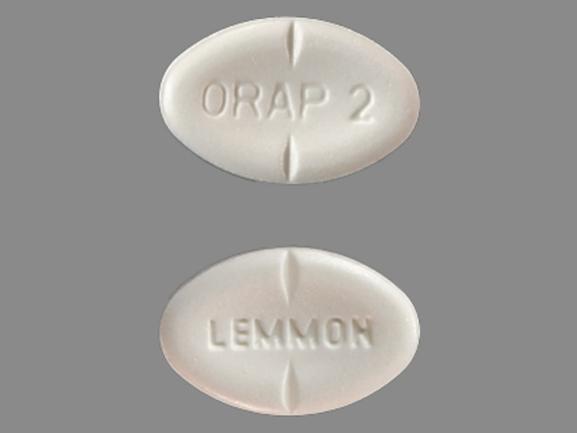Orap and Alcohol/Food Interactions
There is 1 alcohol/food/lifestyle interaction with Orap (pimozide).
Pimozide Food/Lifestyle
Major Food Interaction
You should avoid the consumption of large amounts of grapefruits and grapefruit juice while taking pimozide. Grapefruit can raise the levels of pimozide in your body. This can affect the rhythm of your heart and cause other side effects. Call your doctor if you have symptoms of blurred vision or nausea. You should seek immediate medical attention if you develop sudden dizziness, lightheadedness, fainting, shortness of breath, or fast or pounding heartbeats during treatment with pimozide. Do not increase or decrease the amount of grapefruit products in your diet without first talking to your doctor. You should avoid or limit the use of alcohol while being treated with pimozide. Alcohol can increase the nervous system side effects of pimozide such as dizziness, drowsiness, and difficulty concentrating. Some people may also experience impairment in thinking and judgment. Talk to your doctor or pharmacist if you have any questions or concerns.
Switch to professional interaction data
Orap drug interactions
There are 755 drug interactions with Orap (pimozide).
Orap disease interactions
There are 18 disease interactions with Orap (pimozide) which include:
- dementia
- CNS depression/coma
- previous neuroleptic malignant syndrome (NMS)
- seizure disorders
- acute alcohol intoxication
- CNS depression
- NMS
- pituitary tumors
- QT interval prolongation
- tics
- seizure
- hyperprolactinemia/breast cancer
- neutropenia
- anticholinergic effects
- hyperprolactinemia
- parkinsonism
- tardive dyskinesia
- renal/liver disease
More about Orap (pimozide)
- Orap consumer information
- Check interactions
- Compare alternatives
- Reviews (17)
- Drug images
- Side effects
- Dosage information
- During pregnancy
- Drug class: miscellaneous antipsychotic agents
- Breastfeeding
Related treatment guides
Drug Interaction Classification
| Highly clinically significant. Avoid combinations; the risk of the interaction outweighs the benefit. | |
| Moderately clinically significant. Usually avoid combinations; use it only under special circumstances. | |
| Minimally clinically significant. Minimize risk; assess risk and consider an alternative drug, take steps to circumvent the interaction risk and/or institute a monitoring plan. | |
| No interaction information available. |
See also:
Further information
Always consult your healthcare provider to ensure the information displayed on this page applies to your personal circumstances.


